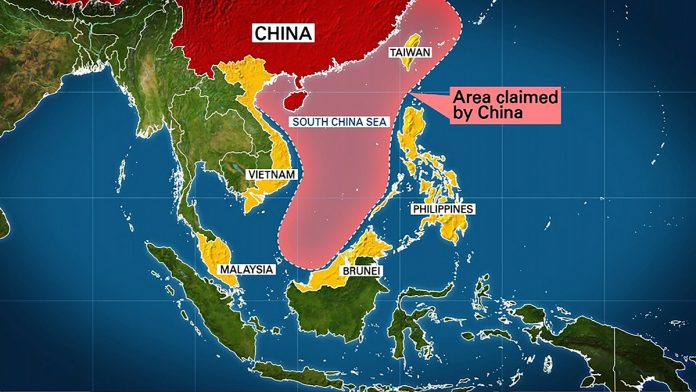Wajeeha Najam
The South China Sea has emerged as a focal point of geostrategic competition, presenting complex challenges for countries far beyond its immediate vicinity. For Pakistan, situated at the crossroads of South Asia, Central Asia, and the Middle East, the developments in this region hold significant implications. The complex dynamics, characterized by overlapping territorial claims, militarization of islands, and competing interests among major global players, pose both opportunities and challenges for Pakistan’s foreign policy and strategic calculus. At the heart of the South China Sea disputes lie conflicting territorial claims between several regional actors, primarily China, Vietnam, the Philippines, Malaysia, and Brunei. China’s assertive actions, including the construction of artificial islands and the deployment of military assets, have heightened tensions in the region. These actions not only challenge the sovereignty of other claimant states but also raise concerns regarding freedom of navigation and overflight in one of the world’s busiest maritime routes.
For Pakistan, a country heavily reliant on maritime trade for its economic prosperity, ensuring the stability and security of the South China Sea is of paramount importance. As a key player in the China-Pakistan Economic Corridor (CPEC), Pakistan shares strategic interests with China, its longstanding ally. However, it also maintains robust diplomatic and economic ties with other claimant states, particularly Vietnam and the Philippines, complicating its stance on the issue. Moreover, Pakistan’s geographical proximity to the Indian Ocean further highlights the significance of the South China Sea in its strategic calculus. The Indian Ocean serves as a vital maritime lifeline for Pakistan’s trade and energy security, connecting it to global markets and energy resources. Any disruption or escalation of tensions in the South China Sea could reverberate across the Indian Ocean, affecting Pakistan’s maritime interests and regional stability.
In navigating the complex web of geostrategic competition in the South China Sea, Pakistan faces several challenges and dilemmas. Firstly, balancing its relations with China, a major economic and strategic partner, while also maintaining cordial ties with other claimant states, requires adept diplomacy and nuanced maneuvering. Pakistan’s support for China’s territorial claims in the South China Sea must be weighed against its broader interests in upholding international law and maritime norms. Secondly, Pakistan’s alignment with China’s Belt and Road Initiative (BRI), of which CPEC is a flagship project, could potentially draw it into the geopolitical rivalries playing out in the South China Sea. While CPEC offers immense economic benefits for Pakistan, it also ties its fate closely to China’s geopolitical ambitions, including its assertive actions in disputed waters. Striking a delicate balance between reaping the rewards of Chinese investment and safeguarding its own national interests is a persistent challenge for Pakistani policymakers.
Furthermore, Pakistan’s relations with the United States and other Western powers add another layer of complexity to its approach toward the South China Sea disputes. While Pakistan enjoys strategic cooperation with the US in counterterrorism and regional security, its deepening ties with China have raised concerns in Washington about its alignment with Beijing’s assertive agenda. Managing this triangular relationship amidst the shifting dynamics of the Indo-Pacific region poses a strategic conundrum for Pakistan. In light of these challenges, Pakistan must adopt a nuanced and pragmatic approach to the South China Sea disputes, guided by its national interests and commitment to upholding international law. Firstly, Pakistan should continue to advocate for peaceful resolution of disputes through dialogue and diplomacy, emphasizing the principles of international law, including the United Nations Convention on the Law of the Sea (UNCLOS).
Secondly, Pakistan should actively engage in regional initiatives aimed at enhancing maritime cooperation and security in the Indo-Pacific, such as the Indian Ocean Rim Association (IORA) and the ASEAN Regional Forum (ARF). By promoting confidence-building measures and cooperative mechanisms, Pakistan can contribute to fostering stability and reducing tensions in the South China Sea. Moreover, Pakistan should leverage its geostrategic position and maritime capabilities to play a constructive role in ensuring freedom of navigation and overflight in the South China Sea. As a member of the Indian Ocean Naval Symposium (IONS) and the Combined Task Force 150 (CTF-150), Pakistan can collaborate with like-minded states to uphold maritime security and counter illicit activities in the region.
In parallel, Pakistan should pursue diversification of its strategic partnerships and economic ties to mitigate overreliance on any single country or bloc. By deepening its engagement with regional powers such as Japan, Australia, and India, Pakistan can enhance its diplomatic leverage and mitigate the risks associated with geopolitical rivalries in the South China Sea. Furthermore, Pakistan should invest in enhancing its maritime domain awareness and capabilities to effectively safeguard its maritime interests in the broader Indo-Pacific region. This includes modernizing its naval fleet, bolstering coastal surveillance infrastructure, and investing in human capital development to build a skilled maritime workforce. Ultimately, Pakistan’s approach to the geostrategic competition in the South China Sea should be guided by a combination of pragmatism, diplomacy, and strategic foresight. By actively engaging in regional initiatives, diversifying its strategic partnerships, and strengthening its maritime capabilities, Pakistan can navigate the challenges posed by the evolving dynamics of the South China Sea while safeguarding its own national interests and contributing to regional peace and stability.
The author is a Research Officer at Rabita Forum International (RFI).







